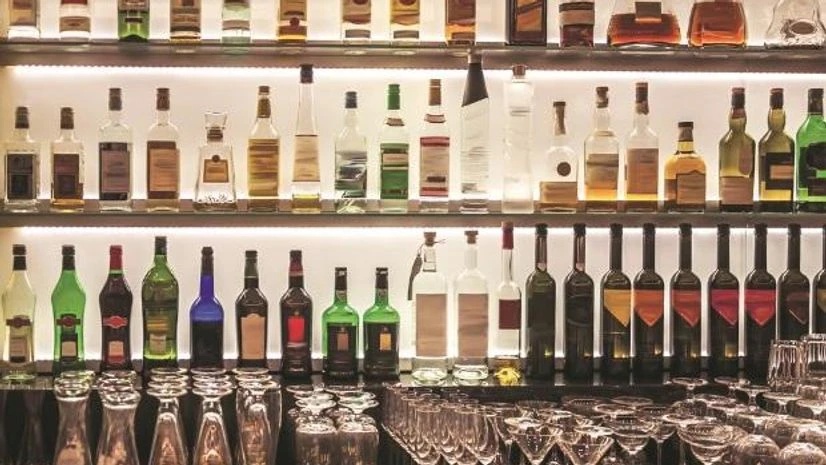The Delhi government on Tuesday gave in-principle approval to a long-standing demand for home delivery of alcoholic beverages from manufacturers and retailers.
While the move might have brought cheer to winebibbers, their excitement may be short-lived. The riders that come with the gazette notification are expected to delay the process by weeks.
The provision for home delivery of liquor has been made by amending the Delhi Excise (Amendment) Rules, 2021, that now allows entities holding an L-13 licence to deliver both Indian and foreign-made alcoholic beverages to your doorstep, when ordered via mobile applications or web portals. Further, it also said that restaurants, hotels, and clubs in the Capital may be allowed to serve alcohol to their patrons at open spaces within their premises.
While the notification was issued on Tuesday, industry experts said the lack of further clarification on the issuance of the required legal permits, and the imposition of caveats, will delay home deliveries.
For instance, the required licence – L-13 – is an entirely new permit that all willing delivery partners will have to obtain. “This is a new licence, which means none of the existing retailers – online or offline – have it. So far, only the gazette notification on amendments of rules have come out. But there is no clarity on obtaining such a licence,” said Vinod Giri, director general of the Confederation of Indian Alcoholic Beverage Companies (CIABC).
According to CIABC, a body representing leading liquor manufacturers, the industry is ready with technological know-how on ways to plug any leaks like delivery to minors.
“Mumbai and Kolkata are two good examples that show that the mechanism of home delivery of liquor can work without any adverse fallout. Sales growth in Maharashtra this year over last year shows that such prompt measures by the state government helped the state recover some loss in sales forced by Covid lockdowns,” said Giri.
However, steep delivery rates being charged in cities like Kolkata – Rs 100 per bottle – may remain a major hindrance to the mass adoption of home delivery even in Delhi.
The lack of clarity on the supply mechanism has kept leading restaurant aggregators like Zomato and Swiggy at arm’s length. According to sources, while both have experience in liquor delivery, they are expecting a delay of weeks in Delhi.
Clubs, restaurants, and hotels with in-house bars are better positioned to start serving alcoholic beverages to customers, compared to delivery partners and retailers. Since most establishments are well-stocked, if the government formally issues a notification allowing these businesses, they can resume services within hours, said some restaurant representatives.
With inputs from Neha Alawadhi
While the move might have brought cheer to winebibbers, their excitement may be short-lived. The riders that come with the gazette notification are expected to delay the process by weeks.
The provision for home delivery of liquor has been made by amending the Delhi Excise (Amendment) Rules, 2021, that now allows entities holding an L-13 licence to deliver both Indian and foreign-made alcoholic beverages to your doorstep, when ordered via mobile applications or web portals. Further, it also said that restaurants, hotels, and clubs in the Capital may be allowed to serve alcohol to their patrons at open spaces within their premises.
While the notification was issued on Tuesday, industry experts said the lack of further clarification on the issuance of the required legal permits, and the imposition of caveats, will delay home deliveries.
For instance, the required licence – L-13 – is an entirely new permit that all willing delivery partners will have to obtain. “This is a new licence, which means none of the existing retailers – online or offline – have it. So far, only the gazette notification on amendments of rules have come out. But there is no clarity on obtaining such a licence,” said Vinod Giri, director general of the Confederation of Indian Alcoholic Beverage Companies (CIABC).
According to CIABC, a body representing leading liquor manufacturers, the industry is ready with technological know-how on ways to plug any leaks like delivery to minors.
“Mumbai and Kolkata are two good examples that show that the mechanism of home delivery of liquor can work without any adverse fallout. Sales growth in Maharashtra this year over last year shows that such prompt measures by the state government helped the state recover some loss in sales forced by Covid lockdowns,” said Giri.
However, steep delivery rates being charged in cities like Kolkata – Rs 100 per bottle – may remain a major hindrance to the mass adoption of home delivery even in Delhi.
The lack of clarity on the supply mechanism has kept leading restaurant aggregators like Zomato and Swiggy at arm’s length. According to sources, while both have experience in liquor delivery, they are expecting a delay of weeks in Delhi.
Clubs, restaurants, and hotels with in-house bars are better positioned to start serving alcoholic beverages to customers, compared to delivery partners and retailers. Since most establishments are well-stocked, if the government formally issues a notification allowing these businesses, they can resume services within hours, said some restaurant representatives.
With inputs from Neha Alawadhi

)
